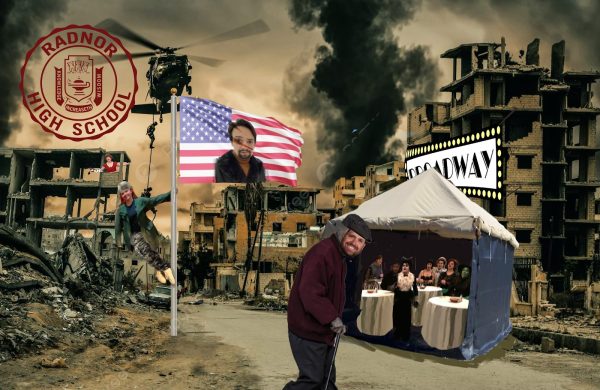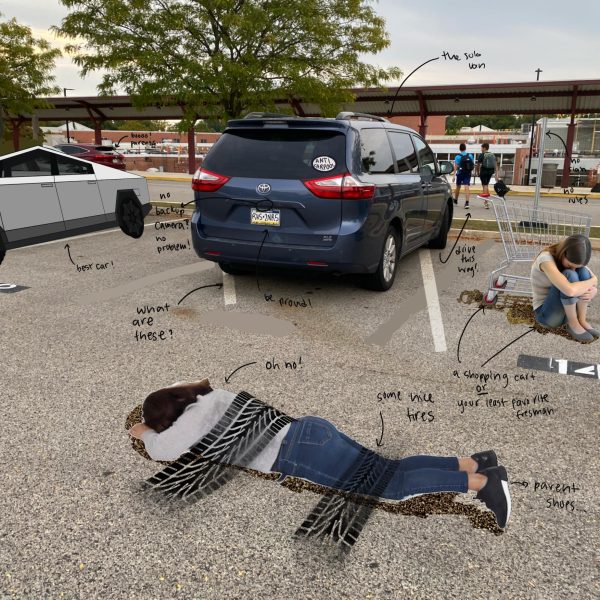Colon Cancer Awareness Month: Sharing Mrs. Obenski’s Story
May 2, 2019
Mrs. Nicole Obenski sits at her crowded desk as students fill the library. She gazes down towards the floor as if she is looking for something; she picks up her phone and accepts a call. When I assume she is finished, I slowly walk in her direction. She is dressed in a warm sweater and a large smile as she realizes that I am approaching. In a closer look at her workspace, I notice that she has a binder with endless pages and that is neatly color coded with dividers. A careful arrangement of flowers occupies the area near her phone, giving off vibrant shades of yellow, white, and orange. She possesses two water bottles, one of which has a dark blue cancer awareness ribbon on it. After greeting me, she leads me into a conference room and takes a seat. The room is empty aside from the abundant rows of books stacked on shelves just to the side of us. I look across the lengthy table and notice that we were positioned unproportionally to the right side, positioned face to face. Eager to know more about her story, Mrs. Obenski openly agreed to record a discussion regarding her experience with colon cancer.
As an introduction to our conversation, I wanted to get to know her a little better, so I asked about where she grew up. She explained, “I grew up in Lansdale Pennsylvania. It is about 35 minutes from here.” Then, curious to find out how she found her way to Radnor High School and interested about her specific current position, I asked when she realized that she wanted to work with kids. She explained:
“I’ve always enjoyed kids, but I initially wanted to be a pharmacist. After working at a pharmacy for a couple of years, I realized that it was not the career path that I wanted to take. I still wanted to do something hands on with science, so I then wanted to be a physicians assistant. I later realized that that also was not for me. After working a job a couple months after college, I realized that I wanted to presume teaching. I went back to school to get my teaching certification, and I would say that this was when I was around 24 years old. That was when I officially decided that I wanted to peruse teaching and make a difference.”
Mrs. Obenski’s passion for working with children was apparent. To further explore her interests, I asked her if she had ever seriously pursued another career path. She replied, “other than what I previously explained, I had a job at a large science company, and, while I was in nights school for teaching, and I worked at a Marriott hotel during the day. I would not say that there was another major career occupation that I had; I worked for a very short time before returning back to school to teach.”
Feeling as though I was getting a better sense of who she is, I became even more curious about her battle with cancer. To delve into this deeper, I asked her when she was diagnosed and with what types. She responded shortly, “In January of 2017, I was diagnosed with stage four colon cancer. It came back in the December of 2018.” After understanding the severity of her condition, I noted how incredible it is that she is still able to work for Radnor. This lead me to ask what types of complications she faces at work on a daily basis. She described:
“A month before finding out, I was not here [at Radnor High School] every day, and it was very difficult. I was very weak and fatigued; it definitely interfered with my job responsibilities here. The minute I was diagnosed, I decided to take a leave of absence for about a year and a half. It was probably the best decision because chemo was very difficult, and I had two major surgeries. This time around, when I got the cancer back in December, one of my first thoughts was that I am not going to be staying home and that I do want to work. Even not knowing what lies ahead, I just knew that wanted to be here to keep my mind off of it and to keep a daily routine. I also knew that all of the students would lift me up. On the day that I don’t feel as good, I knew that I’d have to stay home, take care of myself, and make my health a priority. If that means that I can’t be here and that I can’t have my normal routine, at the end of the day I have to take care of myself.”
Obenski’s self awareness demonstrates the value of knowing your limits. At this, I began to think that she likely has had to adapt her life to meet her new and more strenuous needs. This lead me to asking what changes she has consciously made to her life after being diagnosed. She answered: “at school, I now have an elevator key, and I have a cart that wheels around my belongings because I am just not able to lift anything right now. I have a lot of help at home for the days that I do not have anything, and for when I do not well well. For cooking and cleaning, my husband and family are a huge help. I am just starting to get back into some light exercise, but it really just depends every day how my body is feeling on what I am able or not able to do.” By this point, it was evident that Mrs. Obenski was an extremely strong woman. I asked her if she felt like there was anyone in particular that inspired her devotive nature, surely a role model had sparked such a dedication. She said, “my husband for sure, but going back even farther, definitely my parents and the way I was raised. I owe a lot of my work ethic to them and putting my all into things. They have really contributed to my ability to stay dedicated.”
Hearing about Mrs. Obenski’s family, it was nice to see that she has had many supporters. I couldn’t help but wonder if anyone with whom she was close also suffered from cancer. I began to discuss with her the impact that others had on her recovery. With that, I also questioned if there was anyone in her life who also suffered with cancer. She remarked, “yes. There have been two coworkers here, one diagnosed before me and the other diagnosed after me, that have been a major help to me as I am going through my treatment. I also had a mentor through the Cancer Hope Network, and she is someone how was diagnosed around the same age as I was, with even the same kind of cancer. We would talk every couple of weeks. She is someone who has been there and knows exactly what I’ve been through. Having her as someone to talk to and ask questions, that was a huge help when I was first diagnosed.”
At the end of our discussion, I finally asked how her support system has impacted her positive outlook on recovery. She responded, “Like I said, meeting other people through my volunteer work, including other survivors, and being able to connect with them has really been a great recourse.” By the end of the interview, I really started to develop a clear picture of who Mrs. Obenski was.
Before closing the discussion, I gave her a chance to inform me of anything else she thinks is important to note. She did not hesitate to say, “with March being colorectal cancer month, this is the time to emphasize how important it is to get screened. If you have any family history of colon cancer, or if you have a change in bowel habits, now is the time to address it. Being younger and working with younger students, there is no doubt that it is on the rise for people between their twenties and thirties. Research is not sure exactly why that is happening, but just getting the word out- especially to younger people- is important because it is one of the most preventable cancers if found early. I think that my main thing right now it is to just spread awareness. I hope that I am an inspiration to a lot of people to have good resilience and coping skills because if I can push through this and work and try to live a normal life, then I hope to inspire people to be able to push through any rough times that they are going through in their lives. Also, I would like to note that I have had colitis since I was nineteen, which surely lead to my cancer.”
Colon Cancer
Colon cancer strikes the lower part of the digestive tract and is known for causing fatigue, unexplained weight loss, abdominal pain, diarrhea, constipation, and bloating. This disease results from mutations in rectal cells. As Obenski described, colon cancer is usually very treatable when caught early.
March: Colorectal Cancer Awareness Month
Colorectal is the larger name under which colon cancer and rectal cancer are placed. “Don’t assume,” a campaign that aims to encourage check ups, spread awareness, and search for a cure, shows particular support for colorectal cancer during March, as well as many other organizations. March has been deemed national colorectal cancer awareness month, making it even more important to be aware of it now. With the support from the nation, treatments and cures are becoming more prevalent and accessible than ever before.
Mrs. Obenski is a warm and caring presence in our Radnor community that we are lucky enough to draw inspiration from each and every day. Her battle with colon cancer is one that requires an immense amount of strength, and yet she is dedicated to serving the school community. For this, we are eternally grateful.






